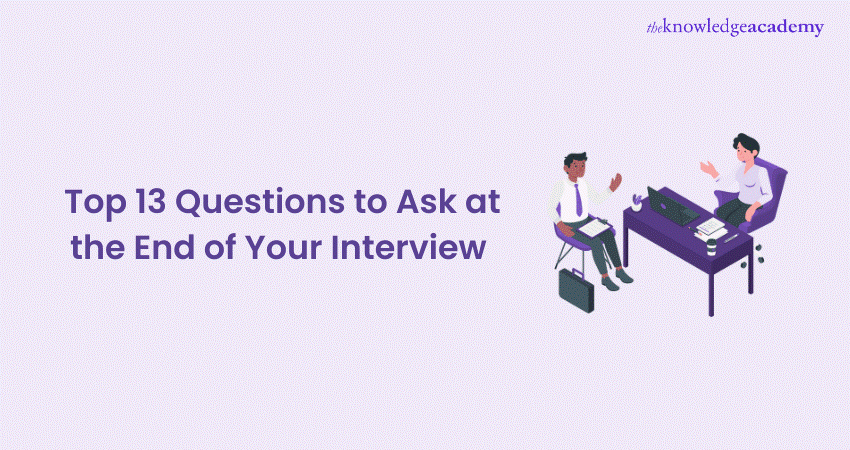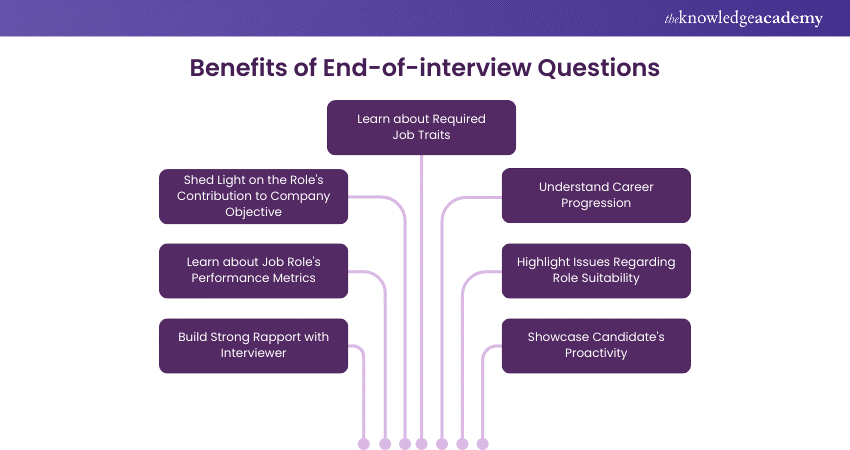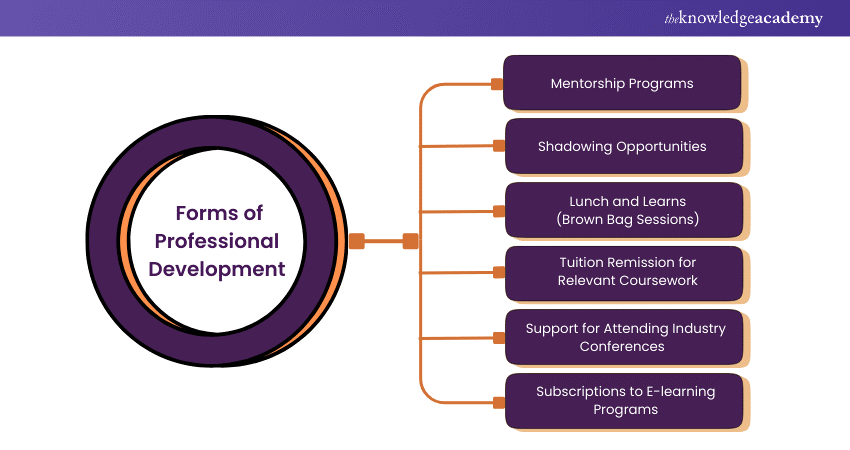We may not have the course you’re looking for. If you enquire or give us a call on 01344203999 and speak to our training experts, we may still be able to help with your training requirements.
Training Outcomes Within Your Budget!
We ensure quality, budget-alignment, and timely delivery by our expert instructors.

A job interview isn’t just an opportunity for a potential employer to learn about you; it’s also your chance to understand the people that you are hoping to devote half of your waking hours to. So, while an interview might seem to be all about an interviewee answering interviewer’s questions, it offers you a chance to pose questions back at the interviewer. So, it’s important to prepare a list of the right Questions to Ask at the End of an Interview because those will deliver the perfect finishing touch.
But the chance usually comes at the end of an interview. This means that when you’re given the opportunity, the queries you pose can significantly influence your interviewer’s perception. Smart and thoughtful Questions to Ask at the End of an Interview can set you apart from other candidates, showcasing your genuine interest and proactive approach.
This blog offers a curated list of 13 insightful questions, designed to leave a positive impression on your employer and gather crucial information about the company and role.
Table of Contents
1) Questions to Ask at the End of Your Interview
a) What is Your Timeline and What are The Next Steps?
b) Do you need me to elaborate on anything regarding my suitability for the position?
c) Is there anything else I can provide to help you with your decision?
d) Has this company changed your original career path?
e) What's one of the most interesting projects you've worked on here?
f) How do you typically measure success in this role?
g) What traits have people that have been successful in the position demonstrated?
2) Conclusion
Questions to Ask at the End of Your Interview
The following 13 questions will help you be well equipped with the potential interviewer’s questions and take you to closer towards securing your dream job role. Let’s explore them below.

1) What is Your Timeline and What are The Next Steps?
When you have the chance to ask questions during an interview, make sure to prioritise this question. Inquiring about what to expect in the subsequent stages of the process will help you paint a better picture of your prospect in the organisation.
Additionally, use this opportunity to discuss any time-sensitive matters, such as other job offers or logistical arrangements including for relocation, transportation or just adjusting to a new schedule.
2) Do you Need me to Elaborate on Anything Regarding my Suitability for The Position?
When you show willingness to provide additional details about your answers listed on your resume, it demonstrates your drive to go beyond the surface level. Interviewers appreciate candidates who are proactive about sharing relevant information and elaborating on their experiences. It shows that you’re invested in the conversation and eager to contribute valuable insights.
3) Is There Anything Else I Can Provide to Help you With Your Decision?
This question highlights your initiative to address any potential uncertainties during the interview process. It not only spotlights your thoroughness but also provides assurance to the interviewer. This way, you convey that you have made every effort to showcase your suitability for the job.
4) Has This Company Changed Your Original Career Path?
This question offers the interviewer an opportunity to share their own experiences, creating a more engaging and personable conversation. People generally appreciate the opportunity to discuss their journey and perspectives. By showcasing genuine interest in their story, you can build a strong rapport and make the interview feel more like a two-way exchange. Techniques learned in NLP Training can be particularly useful in enhancing your ability to engage with others and build meaningful connections.
5) What's One of the Most Interesting Projects You've Worked on Here?
By asking for a specific example, it allows you to gain insight on what the job entails. The example will shed light on how each role’s function contributes to the overall objectives. It will help you better evaluate how you might fit within the organisation.
6) How do You Typically Measure Success in This Role?
Since every job role has performance metrics it’s useful to know them and the associated expectations upfront. Employers often use a mix of quantitative and qualitative measures. For example, sales teams may have sales quotas, while other roles prioritise project deadlines. Additionally, you can inquire about performance review frequency and formal feedback from managers.
Looking for some assistance as you take on a supervisory role? Sign up for our Supervisor Training now!
7) What Traits Have People That Have Been Successful in the Position Demonstrated?
Now that you are familiar with the job description and performance metrics, it’s time to delve deeper and understand what it takes to excel in the job role. This question will shed light on the required job traits that may include strong communication skills, proactivity, writing skills etc.
8) What Are The Opportunities for Professional Development at The Company?
Employers generally prioritise the continuous development of their employees' skills and experiences. So, it’s highly recommended that you ask the interviewer if any formal professional development programs are in place.

Professional development can take many forms including:
a) Mentorship programs
b) Shadowing opportunities
c) Lunch and learns (Brown bag sessions)
d) Tuition remission for relevant coursework
e) Support for attending industry conferences
f) Subscriptions to e-learning programs
9) Where do People Who Have Held this Position Typically end up Next?
This question will help you understand what career progression look like for individuals in this role. Some organisations provide a clear pathway where an entry-level employee can gradually take on bigger responsibilities and earn promotions.
In other companies, career growth is less clearly defined. This question also works well if the interviewer enquires about your career goals with questions such as “Where do you see yourself in the next five to ten years?”
10) How Do I Compare with Other Candidates you've Interviewed for This Role?
This question is awkward but it’s okay to ask only if you have established a good rapport with the interviewer. The response can reveal any concerns or issues the interviewer might have about your suitability for the role. This gives you the opportunity to address and alleviate those hesitations. Using techniques from Neuro-Linguistic Programming can help you approach this question tactfully and respond to feedback constructively.
Looking to amplify your professional stature though advanced organisational skills? Our Organisational Skills Course will help you out - Sign up now!
11) Is There Anyone Else at the Organisation you'd Like me to Meet With?
This question is a great way to gauge how much the organisation values teamwork and collaboration. Additionally, the answer might possibly reveal how many more interviews are to come in the recruitment process.
12) Is There Anything We Haven't Yet Covered That You Think is Important to Know About Working Here?
This is a 'catch-all' question that wraps up the interview nicely. This question provides an opportunity for the interviewer to address any topics you might not have thought of enquiring about. It allows the interviewer to share additional insights about the role, company culture, or team dynamics that could drive decision-making process.
13) Do You Have Any Hesitations About my Qualifications or Experience?
This question demonstrates your self-awareness and confidence. However, you must frame this question it positively. Instead of asking directly about the interviewer’s hesitations, you might consider inquiring about areas for improvement or growth.
For example: "Could you share any feedback for how I can enhance my qualifications or skills for this role?”. This approach maintains a positive tone while still inviting constructive suggestions.
Avoid asking questions that a Google search can easily answer or you can find on the company website. Instead, use your pre-interview research to ask contextually relevant questions that highlights your genuine interest and understanding of the organisation.
Conclusion
Armed with the right questions to ask at the end of an interview can make a significant difference in your job search. These questions help demonstrate your interest and preparedness while offering valuable insights to help you make informed decisions about your career. After all, an interview is a two-way street, and your questions can leave a lasting impression on your potential employer.
Elevate your time management skills through our Time Management Training! Sign up now
Frequently Asked Questions
Upcoming Business Skills Resources Batches & Dates
Date
 Effective Communication Skills
Effective Communication Skills
Fri 13th Sep 2024
Fri 11th Oct 2024
Fri 15th Nov 2024
Fri 13th Dec 2024
Fri 17th Jan 2025
Fri 21st Mar 2025
Fri 16th May 2025
Fri 18th Jul 2025
Fri 19th Sep 2025
Fri 21st Nov 2025







 Top Rated Course
Top Rated Course



 If you wish to make any changes to your course, please
If you wish to make any changes to your course, please


